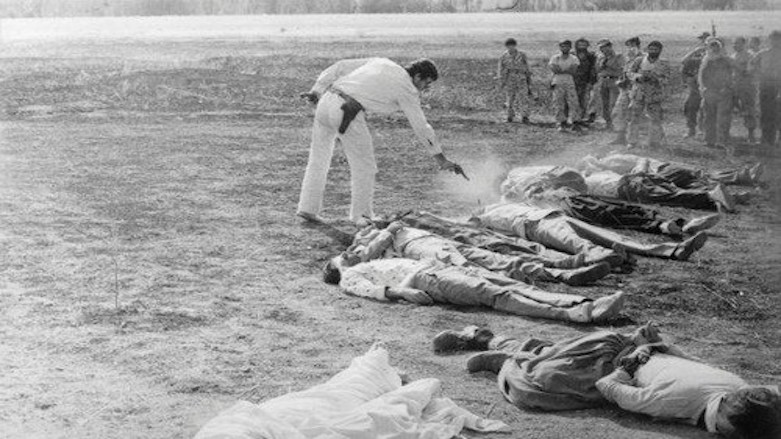Iran’s executioners of today and yesterday, normalized unaccountability

LOS ANGELES, United States (Kurdistan24) – A shocking audio file sparked debate among Iranians in early August when it revealed a former deputy supreme leader of Iran blaming the regime for the arbitrary execution of the opposition in 1988.
Ayatollah Hussein Ali Montazeri is heard in the recently released audio file addressing officials and warning that history will condemn Iran for the crime.
In his memoir, Montazeri had already voiced his objection to the execution of 2,800 to 3,800 people, mostly but not all, members of an Iranian opposition Mujahedin-E-Khalq (MEK).
Amnesty International estimated that Iran killed about 4,500 people in 1988; others speak of larger numbers. Underage prisoners arrested for delivering leaflets for their political parties were among those put to death.
NETHER REFORMISTS NOR HARDLINERS CONDEMN ARBITRARY EXECUTIONS
Weeks into the release of the audio file, Iranian authorities either defend the mass killing or keep silent about it.
"We are proud to have obeyed God's order," said the justice minister Mostafa Pourmohammadi about killing the opposition, despite former denials of involvement.
The killings mainly came as a punishment for MEK after they launched an attack on western Iran near the end of Iran-Iraq war in 1988.
In addition to the rush decision to take away life from people already serving time, the executions also undermined Iranian judiciary system but were not announced in national or foreign media.
Montazeri himself who was expected to replace the then supreme leader, Ayatollah Khomeini, was quickly removed from power for his remarks.
Twenty-eight years after those events, Montazeri’s memoir and his recent audio file remain the most valuable and comprehensive evidence for a dark part of Iranian modern history.
No Iranian leader has referred to the executions of Kurds or other groups when the Islamic Republic took to power in 1979.
Twenty-eight years after the tragedy, a piece of evidence is revealed that could have revived much stronger inquiries in the government and among people. Cultural, political and economic obstacles prevented the predicted reaction.
Even though hardliners and reformists tend to disagree over certain events, for example, whether or not it should be permitted to organize a concert in a religious city like Mashhad, they all seem to agree that the summary execution of thousands of people was justified.
EXECUTIONERS STILL IN POWER
One of the main reason for the approval of killings is that dissecting events that amount to crimes against humanity would get the vast majority of current reformists who are now on “the list of hope,” promising a better Iran to their constituents.
Another reason is that condemning it would mean bringing powerful perpetrators to justice who are currently well established in the regime.
In the 40-minute audio, Montazeri is addressing Iranian authorities who are currently in power: Mostafa Pourmohammadi was the Intelligence Ministry’s representative to Evin prison at the time and is now the justice minister.
Ebrahim Raeisi warned by Montazeri was a public prosecutor in the 80s, and he is currently the head of the Astan Quds Razavi, which is arguably the richest institution in Iran.
Hussein Ali Nayeri was also a judge at the time and a current deputy at the Supreme Court of Iran.
LACK OF ACCOUNTABILITY, THEN AND NOW
Politicians’ denial or defense of past crimes and Iranians collective absence of motivation to demand justice depicts a society where lack of accountability is to some degree normalized.
Pressed under a crippling economy, having lived under excessive suppression for nearly four decades, divided by ethnicity and religion, disillusioned by their revolution, desensitized to the everyday persecution of dissidents, Iranians have failed to bring their executioners to justice.
Consequent, “getting away with murder” sends a loud message to the current torturers and interrogators in the Iranian prisons that they should fearlessly continue their job.
The literal and metaphorical stench of the 1980s executions is wafting in the lives of Iranians today, disproportionately affecting minorities.
In the first two weeks of August 2016, Iran executed at least 48 Kurdish prisoners but admitted to killing only 24 of those.
According to the database Iran Prison Atlas, 915 political prisoners and prisoners of conscience are in detention as of August 2016 – 390 of whom are Kurds.
"They’ll write your names as criminals in the history... History will condemn you,” Montazeri said in August 1988.
Families of the executed still gather in Khavaran cemetery near Tehran every year to commemorate their loved ones who were put into mass graves. Riot police stops families every year.
Editing by Delovan Barwari
